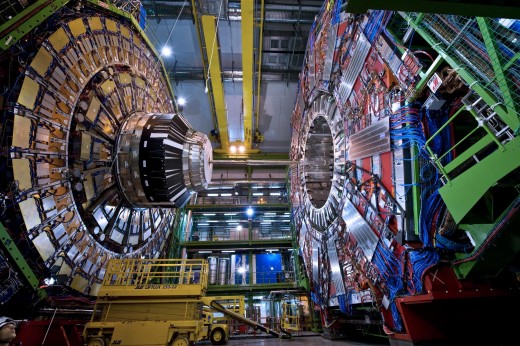CERN and Weird Conspiracy Theories: Part 1

You've probably heard about it before somewhere on the internet, about how CERN's Large Hadron Collider is going to utterly destroy the earth with miniature black wholes, how its actually changing the past and overwriting the present, how CERN's scientists are part of a secret cabal of Satanists who want to open a portal to hell, etc.
Well, I'm here to tell you that, despite the wild claims being thrown around, there isn't (much) reason to be scared, although there are a few interesting to note about it that may have sparked the flame of conspiracy theorists!
CERN
CERN, for the less scientifically savvy among us, is the old French acronym for what is currently called European Organization for Nuclear Research, is the largest and most capable particle physics laboratory currently in operation. CERN's main deal is particle accelerators, hulking masses of electromagnets that accelerate particles at relativistic speeds and cause them to collide with each other, causing massive bursts of energy and strange events that are then studies and may provide us with unprecedented insight on how the universe behaves at a primordial level, which can lead to great advancements in physics.
CERN is mostly known for its Large Hadron Collider or LHC, the world's largest and most powerful particle collider, and its hunt for the Higgs Boson, the so called "god particle", and what allows our current model of physics to work.
As with every great scientific endeavor, CERN has been surrounded by conspiracy theories as the years go by and advancements are made, one of the currently most popular ones is the so called "Mandela" effect.
1 The Mandela Effect

This one's a doozy.
The Mandela Effect has taken the internet by storm as of late, mostly because stories related to it have pretty much achieved memetic status at this point, leading to it being discussed in Reddit, 4chan and probably even right here on hubpages.
The creation of the term "Mandela Effect" is often attributed to Fiona Broome.
Fiona is a long time "ghost hunting" and paranormal enthusiast, and while she wasn't exactly very famous when she was just another person in the ghost hunting bandwagon, her ideas on the so called Mandela Effect have caught on with the paranormal and conspiracy theory internet crowd.
So how does it work? It goes basically like this: Fiona Broome and (supposedly) a lot of other people recall hearing of South African activist Nelson Mandela's death during his time in Pollsmoor Prison during the eighties. However, as we all know, Nelson Mandela died in 2013 from complications of an illness, and had quite the grand funeral too.
This has led Fiona and her adherents to believe that the past has somehow been changed, that is, that in some other timeline, Nelson Mandela did in fact die in prison during the eighties, but that timeline got erased and replaced by a timeline in which Nelson Mandela survived up to 2013. Mandela effect conspiracy theorists argue that, despite the timeline having been changed, their memories have somehow not been altered along with it, and thus they remember Nelson Mandela dying in 1980, rather than in 2013.
But wait, there's more!
A whole lot of other things are said to have been changed by the Mandela Effect. Several people claim to remember Darth Vader in Star Wars: Episode V - The Empire Strikes Back saying "Luke, I am your father" to the protagonist Luke Skywalker, but you see, the actual line spoken in the movie is "no, I am your father", as you can see in pretty much any video of said scene.
Another one is that a whole lot of people apparently remember the world's biggest fast food chain, McDonald's, being named "MacDonald's" instead.

One of the most popular examples of the Mandela Effect's supposed occurrences is related to The Berenstain Bears, a series of children's books written by Stan and Jan Berenstain, relating the shenanigans of the lives of a rural family of anthropomorphic bears.
A whole lot of people seem to recall the bears being named "Berenstein" instead of "Berenstain", and have pointed out several supposed evidences of that being the correct spelling the name in some previous timeline, including a screenshot from one episode of The Simpsons in which the books are references.
But what does any of that have to do with CERN?

Well, the general theory (if you could even call it that) goes that CERN's experiments with particles moving in circles and then bashing into each other close to the speed of light is causing the past to slowly change, and thus altering the present. Some even say CERN is intentionally doing this, though nobody is quite clear on the motives behind this supposed hijacking of the past.
How exactly CERN's experiments are causing these changes, to the point that these people even remember the supposedly erased past timeline?
Erm... I'm not sure. I don't think anybody is, either, but this is conspiracy theory at its best guys, a whole lot of fearmongering without much to back it up.
In fact, this whole conundrum can actually be caused by a well known phenomenon in psychology, something called confabulation.
Confabulation
Confabulation is a very interesting phenomenon that has been studied in psychology for a long time now.
Confabulation can be described as "lying without actually thinking you're lying". Confabulation happens when a person misremembers or even creates a false memory of something in their minds, and then assume that said memory accurately represents reality.
Yes, that's right, our brains can actually create false memories which we assume to be accurate representations of reality. No, this isn't the result of some type of mental disorder or any such thing, it can happen to pretty much anyone, and its actually far more common than you might think.
There's a fair number of theories floating around as to how confabulation actually happens in the brain, the main ones pointing to multiple possible causes such: as remembering dreams as if they were memories of the past, memory inconsistencies caused by drugs, trauma or exhaustion, developmental problems, and simply trying to remember something that happened a really long time ago.
Who can say that they don't remember some things about their infancy and were later corrected about it by their parents and other people? Hell, I have strong memories of owning a particular toy during my childhood, and I remember searching for it one day and just simply not finding it. I then asked my parents about it, and they simply couldn't remember anything about the toy they had given to me themselves! To this day, not any other person has any memory of said toy, except me, of course.
So yes, all these people thinking that the past has somehow changed are simply misremembering it, or they have constructed a false memory about it. Media can play a big part on this, since if something is shown or reported in some incorrect way, people are likely to believe in it as being an accurate representation of the thing they meant to provide info on, and then people finally get to know the original source of the information and find out that it is actually different from what they remember.
Regardless of what the reason may be, I personally think we should consider every alternative before jumping to conclusions related to time warping.






